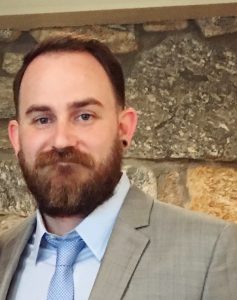
Joseph Nash, ’17, is a former MA student who is now pursuing doctoral studies at the University of Delaware. Read about his experience at UMBC and post-graduation work below:
When I arrived at UMBC as a new MA student in the English department’s Texts, Technologies, and Literature (TTL) program, I was, in a way, lost. I had just rushed through a double-major bachelor’s degree in English and Political Science at UMUC in two years, determined to use every morsel of the thirty-six months of tuition offered by the GI Bill I had earned through five years of service in the Marine Corps. As such, I had taken just enough literature courses to ignite a passionate ambition for scholarship but too few to actually fill that ambition with any meaningful content. I began the TTL program determined to do something but with very few conceptions about what that might look like.
What I found in the English department at UMBC was a community of scholars and experts engaged in conversations covering centuries of literature, pedagogy, rhetorical and compositional theory and analysis, and many other sub-disciplines and issues. I enrolled in courses that seemed interesting and began to comprehend the various landscapes of literature and scholarship that would lead to more clearly articulated academic pursuits as I progressed through the program. While the texts we read and the conversations we had in class were greatly fulfilling, I quickly realized that the most valuable moments of the program were the conversations I had with the professors themselves. I was primarily interested in American literature and criticism, but I must have met five times in my first semester with Dr. McCarthy (a scholar of rhetoric and composition) to talk about my interests and possible pursuits in the program. I cannot overstate the value of such conversations. Even though Dr. McCarthy wasn’t working in the fields I was interested in, she was able (and patient enough) to help me work through my ideas and connect me with other faculty members who were working on similar questions. With every faculty member I spoke to, whether or not I had taken a course with them, I found a thoughtful scholar and teacher who was not only willing but eager to speak with me about their own work, my interests, and where the two might intersect.
On the subject of thoughtful scholars and teachers, I’d be remiss not to mention Professor Shivnan’s training and mentorship of the few of us who were lucky enough to receive graduate assistantships with the English department. Most MA students don’t have the opportunity to teach; even fewer receive the rigorous education, training, and support system offered at UMBC. Through coursework focused on teaching in the composition classroom and the subsequent practice-based training, I was able to teach two semesters of first-year Composition, which further prepared me for the challenges of academia.
Course by course, conversation by conversation, I began to infuse my ambition for academia with the knowledge and skills necessary to chart a realistic path forward. In Dr. Berman I found at once a compassionate and demanding advisor for my MA thesis. I was able to attend two conferences: the 2016 International David Foster Wallace Conference and the 2017 Northeast MLA conference, presenting a paper at the latter. I was also able to travel to Austin, TX to conduct original archival research at the Harry Ransom Center. All of this culminated in my MA thesis, which explored the influence of Buddhist philosophy and meditation practice on David Foster Wallace’s composition of his posthumously published third novel, The Pale King.
Alumni of UMBC’s English department go on to explore and succeed in various careers, as the experiences of past alums corroborate and the department’s pedagogies reflect. Yet, even in their ability to successfully steward students into public spaces and private industries, I’ve found no less support from the department for students such as me who wish to follow more traditional academic paths. With the inexhaustible advice and mentorship from too many faculty members to name—but especially Dr. Berman and Dr. Falco—I applied to fifteen PhD programs, five of which accepted me with full tuition remission and funded teaching assistantships. Ultimately, I decided to go to the University of Delaware, where I’ll be focusing broadly on the literatures of nineteenth- and twentieth-century America and exploring questions about mythology, culture, nationalism, and race. In some respects, I’m still lost, but my experiences at UMBC have given me the tools to find a path.
This spotlight was originally published on August 28, 2017.